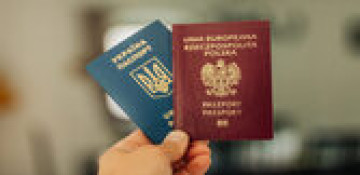Documents Required for Children to Cross the Border
Children under 13 years of age crossing the border in Poland require documents confirming their identity and citizenship. Most often, this is a biometric passport, but in practice, children with a birth certificate and certificates issued by a consulate can also cross the border.
In crisis situations, substitute documents, such as temporary identity certificates, are permitted. The regulations for entry of children from Ukraine to Poland provide for flexibility to ensure the safety of minors during wartime.
Border check procedure for children
Crossing the border by children from Ukraine to Poland is carried out under special simplified procedures. Border Guard officers give priority to minors, ensuring their comfort and safety.
Children citizens of Ukraine crossing the border under the supervision of their parents, legal guardians, or adults who have obtained appropriate authorization. If a child is traveling without their parents, they must present documents confirming the consent of their legal guardians. In such cases, officers additionally verify the authenticity of the documents and the identity of the accompanying person. The entire procedure aims to prevent situations of illegal removal of children and provide them with full legal protection.
Residence status of children in Poland
A child citizen of Ukraine in Poland 2025 benefits from the same regulations as adult refugees. They automatically obtain the right of temporary residence in Poland, access to education, and social benefits.
Children attend public schools under the same conditions as Polish citizens. They also have access to healthcare financed from the state budget. For longer stays, it is possible to obtain a PESEL number, which facilitates access to public services.
Use of the Diia.pl application by children
The Diia.pl application is an electronic tool that confirms the identity of refugees. Currently, children under 13 cannot use the application independently, but their data is linked to their parent or guardian's profile.
This allows minor Ukrainians crossing the border to be registered more quickly when crossing the border, and their residence status is confirmed electronically. This solution also allows schools and institutions to easily verify a child's status.
Role of the Temporary Guardian
For children crossing the border in Ukraine in Poland without their parents, the family court appoints a temporary guardian. Their role is to represent the child in legal, educational, and social matters.
The rules for crossing the border for children in Ukraine stipulate that every minor is provided with institutional support. The temporary guardian is responsible for, among other things, contacting the school, accessing medical care, and submitting administrative applications.
Support from Non-Governmental Organizations
NGOs play an important role in child protection. NGOs support children from Ukraine entering Poland regulations by providing translation, psychological, and legal assistance.
Ocalenie Foundation, Caritas, and UNICEF, among others, are active in Poland, monitoring the situation of children and offering material support. Thanks to the cooperation of state institutions and NGOs, the youngest refugees receive comprehensive assistance.
In summary, the regulations regarding border crossings for children from Ukraine are adapted to the exceptional humanitarian situation and are intended to ensure maximum safety for minors. The requirement to present identity documents – most often a biometric passport or birth certificate – is the basis for registering a child in the system and granting them UKR status.
In crisis situations, flexible forms of identity confirmation are permitted, which prevents a child from being detained at the border due to formal deficiencies. The role of the guardian – the parent – is particularly important.A legal guardian, or a court-appointed person represents the child in legal, educational, and social matters. This allows underage refugees to access education, healthcare, and social benefits on an equal basis with Polish citizens.
Support from non-governmental organizations such as Caritas and the Ocalenie Foundation provides comprehensive psychological, legal, and material assistance. As a result, Poland is creating a child protection system that combines legal requirements with care for their well-being and rapid integration into society.
Frequently Asked Questions
Question
Can a child under 13 cross the Polish border without their parents?
Answer
Yes, but they must travel with a guardian who has parental consent or a court document. In Poland, a family court appoints a temporary guardian to represent the child in legal, educational, and social matters.
Question
What documents are required for a child under 13 to cross the border?
Answer
Most often, a biometric passport or a temporary ID document. In exceptional situations, a birth certificate with proof of citizenship is sufficient. The Border Guard allows various forms of identification to ensure the child's protection.
Question
Can a child under 13 obtain UKR status in Poland?
Answer
Yes, every child citizen of Ukraine automatically obtains UKR status if they legally cross the border. The status grants the right to residence, education, healthcare, and social benefits, similar to adult refugees.
Question
Can a child under 13 use the Diia.pl app?
Answer
Children under 13 do not have their own profile on the Diia.pl app. Their data is linked to the parent or guardian's account, allowing offices and schools to quickly verify residence status and entitlement to benefits in Poland.
Question
Where can I get help with matters related to children crossing the border?
Answer
Support is offered by non-governmental organizations, including Caritas, the Ocalenie Foundation, and UNICEF. They provide legal assistance, translation services, psychological care, and material support. Information is also available from offices and family courts in Poland.





























